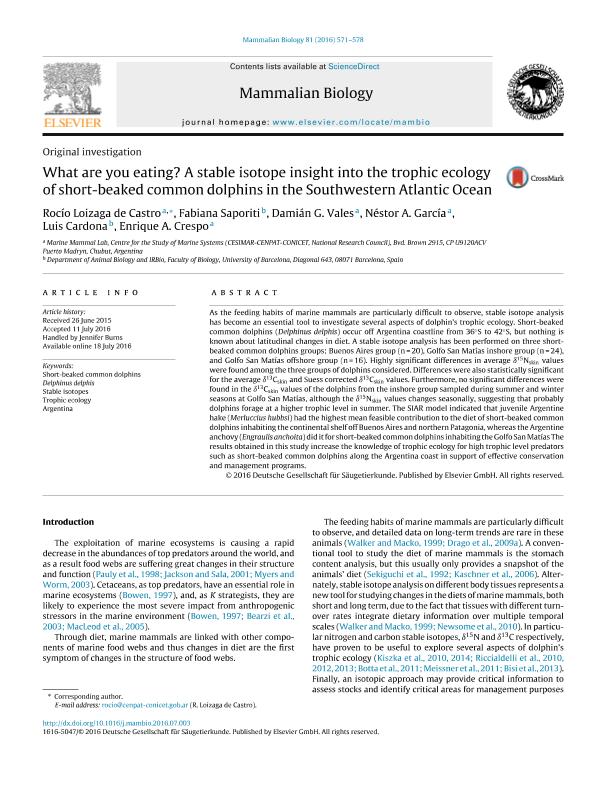Mostrar el registro sencillo del ítem
dc.contributor.author
Loizaga de Castro, Rocio

dc.contributor.author
Saporiti, María Fabiana Sonia

dc.contributor.author
Vales, Damián Gustavo

dc.contributor.author
Garcia, Nestor Anibal

dc.contributor.author
Cardona, Luis
dc.contributor.author
Crespo, Enrique Alberto

dc.date.available
2018-03-02T20:54:48Z
dc.date.issued
2016-11
dc.identifier.citation
Loizaga de Castro, Rocio; Saporiti, María Fabiana Sonia; Vales, Damián Gustavo; Garcia, Nestor Anibal; Cardona, Luis; et al.; What are you eating? A stable isotope insight into the trophic ecology of short-beaked common dolphins in the Southwestern Atlantic Ocean; Elsevier Gmbh; Mammalian Biology; 81; 6; 11-2016; 571-578
dc.identifier.issn
1616-5047
dc.identifier.uri
http://hdl.handle.net/11336/37757
dc.description.abstract
As the feeding habits of marine mammals are particularly difficult to observe, stable isotope analysis has become an essential tool to investigate several aspects of dolphin's trophic ecology. Short-beaked common dolphins (Delphinus delphis) occur off Argentina coastline from 36°S to 42°S, but nothing is known about latitudinal changes in diet. A stable isotope analysis has been performed on three short-beaked common dolphins groups: Buenos Aires group (n = 20), Golfo San Matías inshore group (n = 24), and Golfo San Matías offshore group (n = 16). Highly significant differences in average δ15Nskin values were found among the three groups of dolphins considered. Differences were also statistically significant for the average δ13Cskin and Suess corrected δ13Cskin values. Furthermore, no significant differences were found in the δ13Cskin values of the dolphins from the inshore group sampled during summer and winter seasons at Golfo San Matías, although the δ15Nskin values changes seasonally, suggesting that probably dolphins forage at a higher trophic level in summer. The SIAR model indicated that juvenile Argentine hake (Merluccius hubbsi) had the highest mean feasible contribution to the diet of short-beaked common dolphins inhabiting the continental shelf off Buenos Aires and northern Patagonia, whereas the Argentine anchovy (Engraulis anchoita) did it for short-beaked common dolphins inhabiting the Golfo San Matías The results obtained in this study increase the knowledge of trophic ecology for high trophic level predators such as short-beaked common dolphins along the Argentina coast in support of effective conservation and management programs.
dc.format
application/pdf
dc.language.iso
eng
dc.publisher
Elsevier Gmbh

dc.rights
info:eu-repo/semantics/openAccess
dc.rights.uri
https://creativecommons.org/licenses/by-nc-sa/2.5/ar/
dc.subject
Argentina
dc.subject
Delphinus Delphis
dc.subject
Short-Beaked Common Dolphins
dc.subject
Stable Isotopes
dc.subject
Trophic Ecology
dc.subject.classification
Otras Ciencias Biológicas

dc.subject.classification
Ciencias Biológicas

dc.subject.classification
CIENCIAS NATURALES Y EXACTAS

dc.title
What are you eating? A stable isotope insight into the trophic ecology of short-beaked common dolphins in the Southwestern Atlantic Ocean
dc.type
info:eu-repo/semantics/article
dc.type
info:ar-repo/semantics/artículo
dc.type
info:eu-repo/semantics/publishedVersion
dc.date.updated
2018-03-02T15:00:50Z
dc.journal.volume
81
dc.journal.number
6
dc.journal.pagination
571-578
dc.journal.pais
Alemania

dc.description.fil
Fil: Loizaga de Castro, Rocio. Consejo Nacional de Investigaciones Científicas y Técnicas. Centro Científico Tecnológico Conicet - Centro Nacional Patagónico. Centro para el Estudio de Sistemas Marinos; Argentina
dc.description.fil
Fil: Saporiti, María Fabiana Sonia. Universidad de Barcelona; España
dc.description.fil
Fil: Vales, Damián Gustavo. Consejo Nacional de Investigaciones Científicas y Técnicas. Centro Científico Tecnológico Conicet - Centro Nacional Patagónico. Centro para el Estudio de Sistemas Marinos; Argentina
dc.description.fil
Fil: Garcia, Nestor Anibal. Consejo Nacional de Investigaciones Científicas y Técnicas. Centro Científico Tecnológico Conicet - Centro Nacional Patagónico. Centro para el Estudio de Sistemas Marinos; Argentina
dc.description.fil
Fil: Cardona, Luis. Universidad de Barcelona; España
dc.description.fil
Fil: Crespo, Enrique Alberto. Consejo Nacional de Investigaciones Científicas y Técnicas. Centro Científico Tecnológico Conicet - Centro Nacional Patagónico. Centro para el Estudio de Sistemas Marinos; Argentina
dc.journal.title
Mammalian Biology

dc.relation.alternativeid
info:eu-repo/semantics/altIdentifier/url/http://www.sciencedirect.com/science/article/pii/S1616504716300544
dc.relation.alternativeid
info:eu-repo/semantics/altIdentifier/doi/http://dx.doi.org/10.1016/j.mambio.2016.07.003
Archivos asociados
